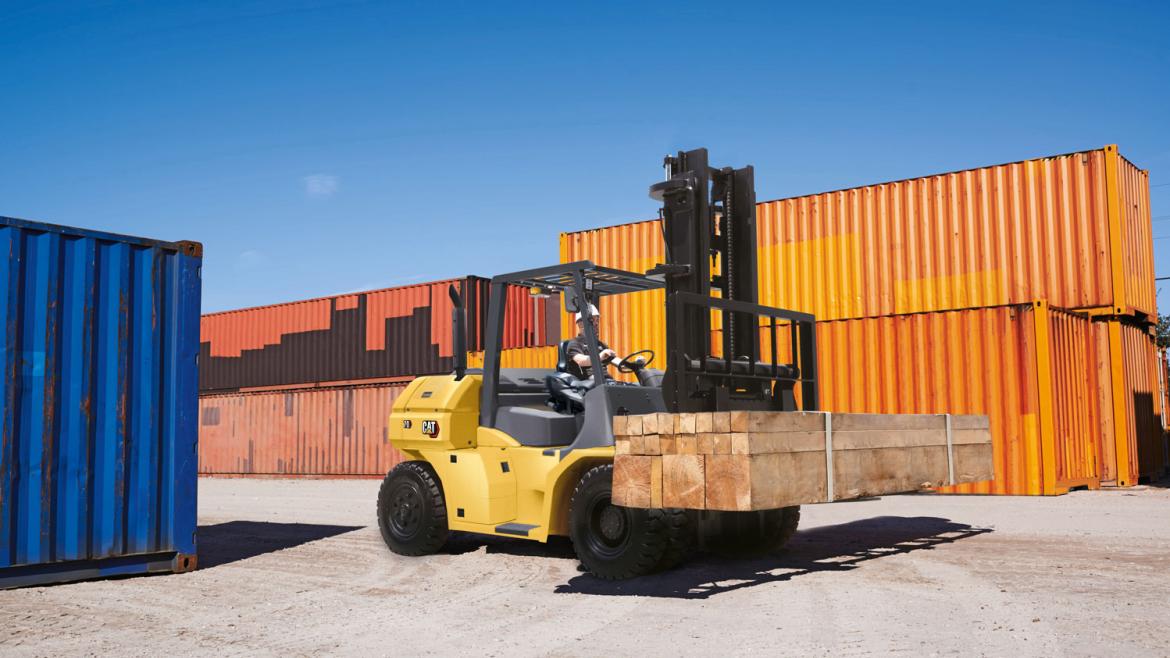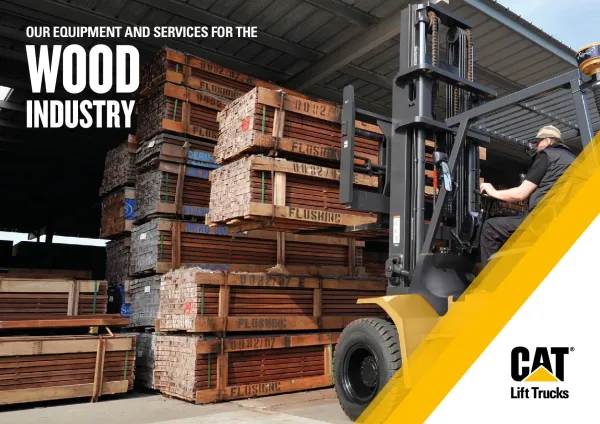

Download Wood Industry Brochure
What can we do for you?
Cat® Lift Trucks and its dealers have long experience of serving the wood industry – also known as the timber industry or lumber industry. Our materials handling equipment and support services extend throughout the wood supply chain. From forestry and logging to processing, storing and distributing wood and the goods created from it. This includes handling of boards, planks, posts and other items used in building and manufacturing.
We also help the industry to handle:
- Materials for paper and pulp processes
- Sawdust
- Wood chips
- Biomass boiler feed
- And much more
You will find our lift trucks in places like:
- Timber and lumber yards
- Saw mills
- Paper, pulp and chipboard mills
- Wood product factories
- Wood product warehouses and distribution centres
Meeting your challenges
Difficult loads
Materials handled in the wood industry can be very heavy, requiring large and powerful lift trucks. The loads are often extremely long, tall, wide – or all three. Manoeuvring such awkward items becomes even more challenging in tightly filled stock yards. In some indoor applications, long loads need to be carried, stored and retrieved in narrow warehouse aisles.
To achieve these movements quickly and without accidents, the lift trucks must provide:
- Great manoeuvrability
- Excellent all-round vision
- Precise control
The same lift trucks might also have to deal with a wide variety of smaller loads. These could include palletised goods and even individually picked orders. Versatility is essential.
Harsh working conditions
In timber yards and similar workplaces, forklifts and drivers sometimes face extreme weather. They may be working long hours and intensive shifts, whether outdoors or indoors. Dust, dirt and debris rubbed from wood products may threaten to damage engines. Rough and uneven ground can make operation uncomfortable and risk destabilising the truck and its loads.
Robust construction, high levels of stability and effective suspension are essential. For drivers, comfort and ergonomics are vital if productivity is to be maintained.
Product care
Wooden materials and products may be vulnerable to damage during handling. Each product has its own particular needs. Chipboard, fibreboard (including MDF – medium-density fibreboard) and OSB (oriented strand board) are just a few examples of materials with different vulnerabilities. Even raw logs need to be protected from rough treatment, to maintain the quality and value of their wood. Load stability and use of appropriate forks or attachments are important considerations.
Safety
Key risk factors to consider in the wood industry include:
- Loads may be large and very heavy
- Storage areas – outdoors or in warehouses – may be densely packed, with little space for manoeuvring
- Workplaces may be especially busy
These characteristics can increase the dangers and consequences of collisions and load spillages.
Sustainability
Wood is seen as a sustainable product, and customers expect high environmental standards from those who work with it. That extends from managing forests responsibly to minimising the carbon footprint of all subsequent processes. Use of electric power rather than fossil fuels, wherever possible, is one increasing demand.
Costs
Like all industries, the wood sector needs to cut costs if it is to remain profitable and competitive. The large size and expense of the lift trucks it requires is a major issue. Reducing fleet size by optimising the usage and versatility of these trucks is one approach to economising. Another is to choose highly durable trucks which require little maintenance. Energy efficiency is also important.
Our materials handling solutions
Electric or IC engine?
Electric forklift trucks are the ‘green’ choice, but are they strong enough for heavy wood applications? The answer from Cat Lift Trucks is yes. Look at our 6.0 to 12.0 tonne, 4.0 to 5.5 tonne and other electric ranges.
If diesel or LPG forklifts are better suited to your application and circumstances, we have those too. Our 4.0 to 5.5 tonne diesel range, amongst others, is popular in wood-related operations.
Precise and confident handling
We offer different fork lengths, as well as fork positioners and side shifters. Clamps and other attachments can be fitted by specialised suppliers to suit your loads. Clear all-round vision is designed into all our trucks. This applies to their mast, overhead guard and overall truck shape, including the counterweight.
Manoeuvring is especially agile in our electric counterbalance models, whose features include a +100⁰ rear steering axle. Advanced electronic control maximises precision in all Cat electric counterbalance and warehouse trucks.
Our four-way reach trucks are ideal for handling exceptionally long loads in narrow aisles. Thanks to a wide hydraulic fork spreader, they can also carry smaller loads including standard pallets. This flexibility combines with fast direction changes and four-way movement – forward, backward, leftward and rightward – for swift manoeuvring.
Within the wood industry, there are many other bulky, cumbersome and awkwardly shaped products to handle. We can find solutions, whether standard or specially customised, within our warehouse range. Our medium/high-level order pickers and man-up turret trucks, for instance, can solve such problems.
Whatever the environment
For dusty and dirty workplaces, we can optionally fit our IC engine forklifts with protective features like double air filters. On our electric trucks, effective sealing against water and dust is a priority. Cat products are, of course, famous for their durability in tough conditions. On bumpy ground and slopes, a combination of low centre of gravity and advanced control systems helps maintain stability.
Drivers enjoy a smooth ride, thanks largely to seat suspension, vibration damping and low-noise technologies. Weatherproof cabin options, with heating and/or air conditioning if required, keep users productive in every climate. Cat lift trucks are always designed with the driver in mind. This is reflected, for example, in their comfortable, spacious operating compartments, ergonomic controls and easy entry and exit.
Handled with care
Our fork positioners are amongst the options you may select to keep loads stable and avoid damaging spills. When handling long loads, the option of dual front tyres enhances lateral stability. A wide fork carriage or wide side shifter also helps. Attachment suppliers can add a variety of clamps to hold raw wood and processed wood products securely without causing damage.
Safer workplaces
We use our truck designs and technologies to reduce the chances of collision with people and structures. Good vision, coupled with precise manoeuvring and control, is fundamental. Along with effective braking, we provide automated safety aids such as intelligent curve control. Failsafe features include presence-detecting seat switches and automatic parking brakes. Comprehensive lighting options ensure the driver can see and the truck can be seen.
Lowering your total cost of operation (TCO)
Whether you choose electric or IC engine forklifts, our advanced, energy-efficient technologies will maximise productivity and cut consumption. Meanwhile, durable quality and inbuilt component protection will help maintain resale value and minimise repair and part replacement needs. Low maintenance requirements and easy access for servicing will further reduce ongoing costs and downtime.
An important advantage of Cat solutions in this respect is our common component strategy. High levels of component sharing between ranges maximise parts availability. This means higher first-time fix rates, less downtime and lower related costs. By cutting the number of service-related journeys, it also shrinks your carbon footprint. That’s another green choice.
The versatility of Cat counterbalance forklifts and warehouse equipment allows operations to function with fewer truck types and smaller fleets. This capability is enhanced by a rich variety of optional features for each model. Here are just some of the versatile Cat warehouse product groups which may be useful at your sites:
- Power pallet trucks
- Stackers
- Reach trucks
- Order pickers – low-level/2nd-level and medium/high-level
Keeping your operation in productive action
Wherever you are, Cat lift truck dealers are ready and equipped to support you. Their deep understanding will ensure the perfect choice and combination of lift trucks for your application. Then their mobile engineers will keep them working at peak performance through expert routine maintenance and rapid response to any emergency. They have access to the fastest parts supply operation in the business.
Together, Cat Lift Trucks and its dealers will ensure you have everything you need. Choose Cat forklifts and services for productive, efficient and cost-effective materials handling in the wood industry.

Find Your Local Dealer
Your nearest Cat lift trucks dealer is equipped to provide maintenance services and help locate and supply the genuine parts you need.
Get started by selecting your region:
